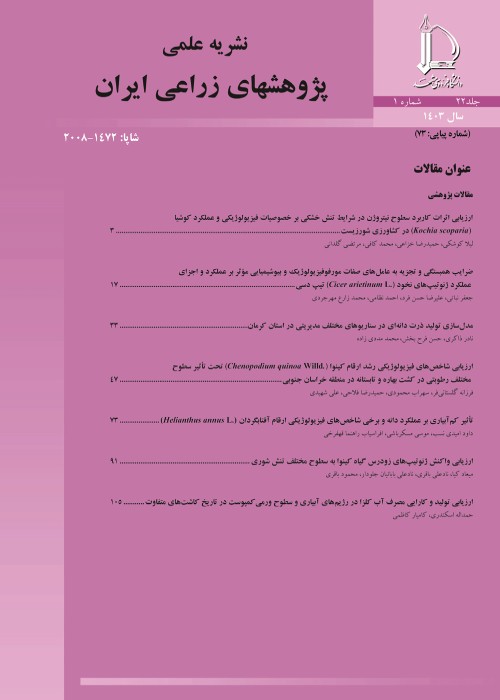Evaluation of Yield and Oil Quality of Safflower (Carthamus tinctorius L.) Seeds under Plant Growth Motivate Foliar Application and Harvest Time
The global approach to produce oilseed is sustainable agricultural system, and their management practices such as the use of organic and biological fertilizers to enhance the quantitative and qualitative performance of oilseed crops. Safflower (Carthamus tinctorius L.) a multipurpose plant and cultivate mainly due to the high quality of its oil, and it belonged to the Asteraceae family. Foliar application of plant growth motivate is an effective way of stimulate plant growth and yields. Harvesting date is one of the most important variables of production. Sunflower oil content increased rapidly after 15 days and reached the highest level at 30 to 35 days after flowering. This study was performed to compare the effects of plant growth motivate foliar application and harvest time on yield component and oil content and fatty acid composition of safflower.
A trial was conducted as a randomized complete block design with 10 treatments and four replications in 2015-2016, and was repeated in 2016-2017. The treatments included: pigeon manure extract (1:10), salicylic acid (1 mmol), methanol (2 g.l-1), Arman (3 g.l-1) and control (distilled water). Arman (Brand) is a completely organic and nutritious compound for plants that is a mixture of several non-toxic elements. Plants were harvested in two stages, when seed reached to the physiological and technological maturity. Evaluated traits were including biological and seed yield, thousand seed weight, oil (percent and yield), protein (percent and yield), and oil analysis. The statistical analysis of the design was done using SAS software version 9.4 and the comparison of the means by LSD test at 5% probability.
The results of the analysis of variance showed that effect of foliar application on biological and seed yield, 1000 seed weight, oil percentage and yield, protein percentage and yield were significant at (p≤ 1%). The effect of harvesting time on biological yield, oil percentage, oil yield, protein percentage and protein yield was significant at (p≤ 1%), and on 1000 seed weight at (p≤ 5%). Also the interaction between foliar application and harvesting time was significant on the palmitic acid and stearic acid at (p≤ 1%), and the effect of foliar application was significant on the linoleic acid at (p≤ 1%), and interaction of foliar application and year was significant on the oleic acid at (p≤ 5%). The results of oil analysis showed that all materials applied had a positive effect on the quality of safflower seed oil, so that foliar application with pigeon manure extract caused 13% increase in the linoleic acid in second harvest amount compare to the control, which was in a statistical group with Arman, and methanol. According to the results of the mean comparison the highest biological yield, seed yield, thousand seed weight, oil percent and yield, belonged to applied to the foliar application with pigeon manure extract. According to the mean comparison, the highest value of palmitic acid and stearic acid was obtained from the control in the first harvest harvesting time (seeds physiological maturity). Extract of pigeon manure increases the level of green vegetation, photosynthetic activity and plant heights, which is an effective factor in increasing yield. Also, the highest biological yield, thousand seed weight belonged to the first harvest time, and the highest oil (percent and yield), protein (percent and yield) belonged to the second harvest time. The grain weight increases until the morphological maturity, but after that, the transfer of the material to the seed is cut off and the internal composition of the grain becomes the material with a higher recovery level, therefore, a slight decrease in the grain weight reasonable seems. The amount of oil usually reaches a stable level at physiological maturity, and has a slight change up to the time of seed maturity, and the observed differences are due to environmental factors, especially the temperature.
According to the results, spraying of pigeon manure extract, Arman, methanol, and salicylic acid showed an increase of yield compared to the control in climatic conditions of Urmia. Foliar application improved the yield components by increasing the yield of oil and protein. Finally, it can be stated that spraying with the extract of pigeon manure had a more effective and efficient effect on the quality and quantity of safflower than other treatments. The second harvest date preferable.
- حق عضویت دریافتی صرف حمایت از نشریات عضو و نگهداری، تکمیل و توسعه مگیران میشود.
- پرداخت حق اشتراک و دانلود مقالات اجازه بازنشر آن در سایر رسانههای چاپی و دیجیتال را به کاربر نمیدهد.


